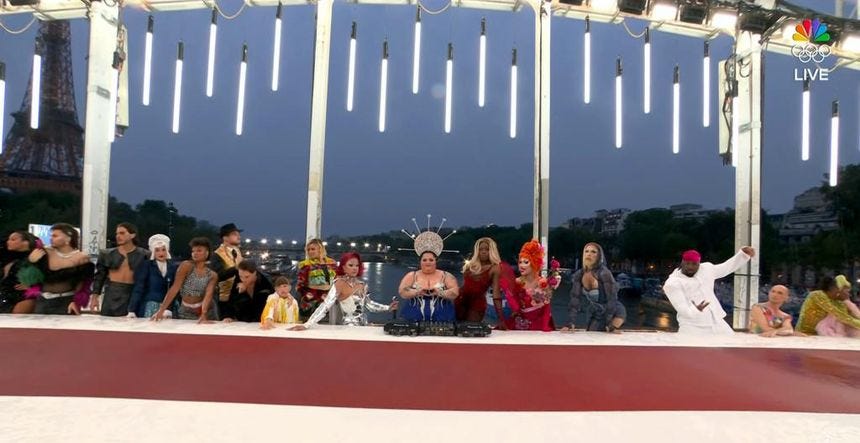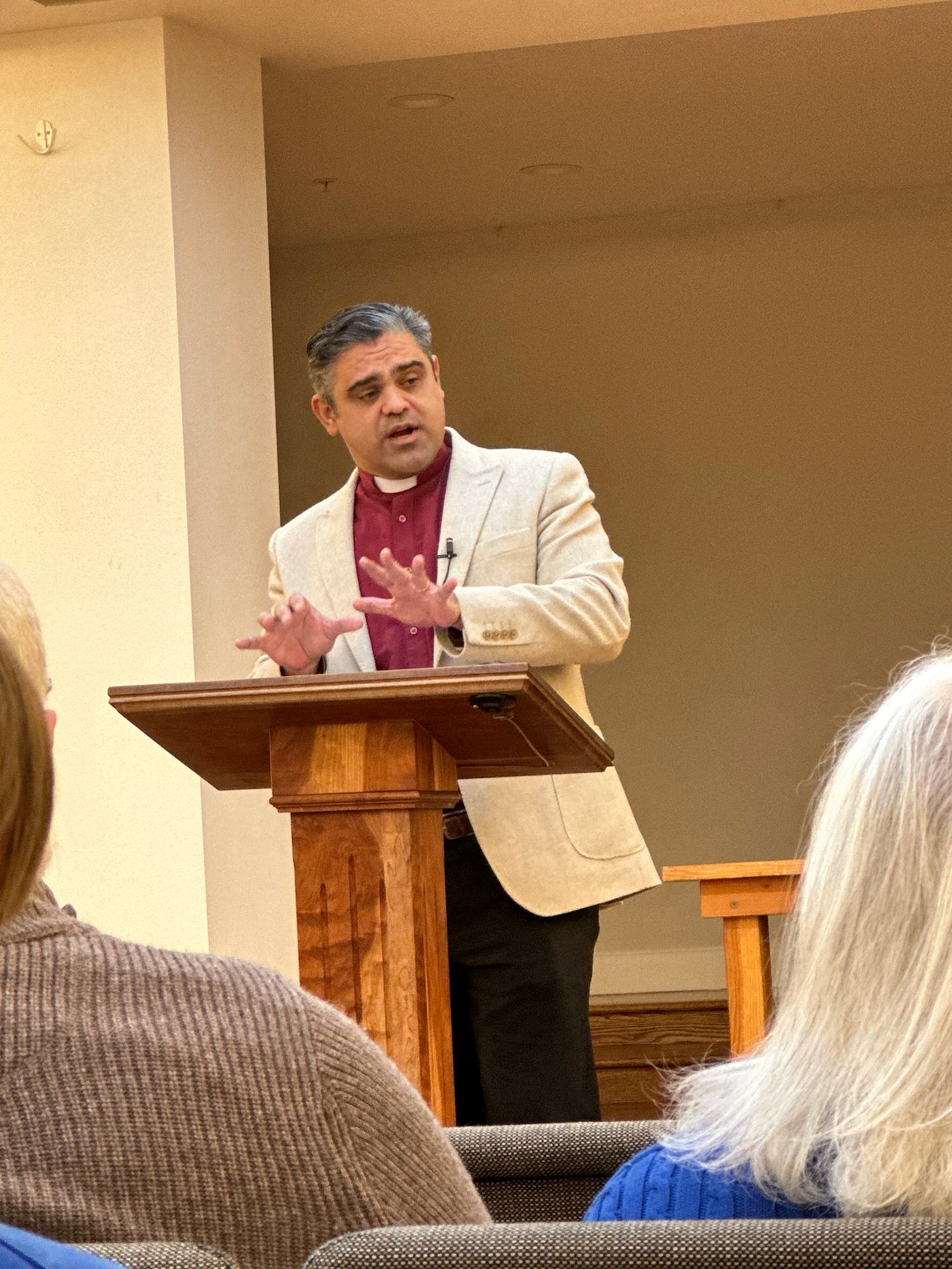The Story of a Tree: Dust in the Wind, Part 5
The Garden Story is about a man who failed his test to protect his bride; it's about a tree that should have been left alone at that time.
In the Chronicles of Narnia, C.S. Lewis writes, “As Adam’s race has done the harm, so Adam’s race shall help to heal it.” The result of the Fall turned the virtues of love, joy, and patience upside down. The Fruits of the Spirit were absent on that day in Eden. But not all was lost. Amid the curses, God made promises. He promised that the Serpent would be crushed and that history would find relief when Mary gave birth to the new Adam, Jesus Christ. If the first Adam did the harm, the new Adam will heal it.
The Negative World
We live in a negative world with strange creatures on the stage of the Olympic ceremony. The Serpent sows sexual confusion, and the seed of the Serpent will express that confusion. Women will dress like men, men like women, and they will try to change nature. In the Garden, the Serpent wants Adam and Eve to change their natures by giving up their roles in creation. What happened on the stage in Paris was not out of the ordinary. That’s what the children of the serpent do. But we may look at these things and say, all is lost. We are in a doom-loop. Every cycle will be more disorientation, sexual paganism, and more Serpent stuff. But even amid these shenanigans, I have never known a better stage of history to have babies, to proclaim the Gospel, and to sing the Psalms than the year of our Lord 2025. It’s a negative world, but it’s a positive universe where Jesus rules.
Augustine wrote in the 4th century that “Satan is bound like a dog.”[1] But he is still roaring like a lion seeking whom he may devour. We are not utopians. Man still suffers relationally. Communities lack harmony as a result of the Fall. Therefore, we must begin the work of undoing relational turmoil.
Vocational Turmoil
But the second element that impacted the Fall of Man was his vocation.
We conclude our look at Genesis 3 by considering Adam’s curse and the promise made to the new world after the fall.
And to Adam he said,
“Because you have listened to the voice of your wife
and have eaten of the tree
of which I commanded you,
‘You shall not eat of it,’
cursed is the ground because of you;
in pain you shall eat of it all the days of your life;
thorns and thistles it shall bring forth for you;
and you shall eat the plants of the field.
Some have interpreted this curse to say that the ground itself is cursed. That’s not true. It’s not the ground itself that is cursed; it’s the ground in relation to man. It is man’s sin that makes the ground unstable and unproductive. Yahweh does not condemn the ground itself; man’s relationship to it is condemned.
Man’s work becomes difficult and even painful. Adam’s task before the Fall wasn’t simple. It had its challenges, but Adam had a perfect nature to deal with those challenges. After the fall, the sons of Adam have a complex responsibility. They are to work, but their relationships and sinful dispositions will complicate their 9-5. Men will be tempted by laziness; they will have physical limitations and many distractions. I remember when someone asked R.C. Sproul what his greatest regret was. And R.C. said, “How much time I wasted!” Even productive people can use their time foolishly. These things will make man’s labor more complicated.
In II Thessalonians 3, Paul picks up this theme when he says: “If anyone is not willing to work, let him not eat.” Of course, there is a time for charity, but Paul is laying out the principle. We have become, by and large, a nation that encourages poverty rather than instilling habits and policies that encourage hard work and discipline in different areas of life.
Work has always been cherished since the days of the Garden, but now work has an additional complexity; the labors of our hands will grow weary, producing calluses for those who work outside and sight problems for those who work in front of a screen.
Now, what is the lesson the LORD is teaching Adam? At creation, God set two trees in the center of the Garden: The Tree of Life and the Tree of Knowledge of Good and Evil. Adam could eat of the first but not of the latter. But what did Adam decide to do? Adam decided he could have life in himself and did not need to seek life from God. He believed that he could live independently of God’s provisions for him. But man can only find meaning if God is his reward; if he works as unto the Lord.
Meaningless Existence?
So far, this image does not look very inspiring. Genesis 3 makes for a terrible motivational speech.
By the sweat of your face
you shall eat bread,
till you return to the ground,
for out of it you were taken;
for you are dust,
and to dust you shall return.”
We work and work, and then we die. Ashes to ashes, dust to dust. Is that all we are? Dust in the wind? But there is more to that than simply this. How is Adam going to respond to this curse?
The man called his wife Eve because she was the mother of all living. And Yahweh God made for Adam and his wife garments of skins and clothed them.
Adam understands the implications of the curse and the promises attached to them. There are consequences, but Adam acts rightly. His first reaction is to return to the job God gave him in the Garden of naming things, except now, he no longer names animals but a fellow image-bearer. Adam is taking his old job back in this post-fall creation. He names his wife, and what does he call her? Eve. What does “Eve” mean? It means life or fire. Adam’s naming of his wife “life” affirms his faith in everything God has said. Through the woman, a Savior would come that would destroy evil and the serpent. From her will come the Messiah, who will reverse death and provide more Eves to bring forth more life to the world. Adam is the head of his wife, but Adam affirms his wife. The woman is the life-bringer. She is the glory of man, as Paul says. We need men leading the liturgy and the service, but the church needs women to bring life to others. Women are life-givers (birth) and life-bringers (in the community).
Adam’s hope here is a hope that looks forward to Easter. His hope is not that he will return to the ground but that through the Seed of the Woman, life will come from the ground.
Some years ago, one of our six-year-old theologians at Providence asked me, “Pastor Brito, will Adam be in heaven?” I believe Adam’s confession in God’s saving plan indicates that we can expect to see Adam in heaven when we die. Adam believed in life after death. Adam believed in life after the fall.
So, what is the end of Genesis 3 affirming? It is affirming that we are fallen. We cannot save ourselves. We are hungry day in and day out, and nothing we do or eat satiates/satisfies that hunger. We crave for purpose, but there is no purpose outside of Jesus. In Christ, our hunger is satisfied.
Our Labors Are Not In Vain
Genesis 3 promises men that our work is not in vain; that our sweat, mowing the lawn, diaper changing, desk job, teaching, and service are not in vain because kings are created for good works. But here is the problem: we lost the Garden. Adam is now king, but he is king of a fallen world. So, Yahweh Elohim must keep his promise to kill Adam. And now the last form of death falls on him. The first death was the loss of perfect communion with God, and secondly, Adam dies in his loss of communion with the Garden:
…therefore the LORD God sent him out from the garden of Eden to work the ground from which he was taken. He drove out the man, and at the east of the garden of Eden he placed the cherubim and a flaming sword that turned every way to guard the way to the tree of life.
Adam is now driven away from the Garden. He is sent to rule a world that he knows nothing about. The Garden was safe. The world outside the Garden is dangerous and full of violence and physical death. I am sure Adam wanted to start over. I am sure he wanted to go back to the Garden, but Yahweh had another plan for the creation. And so, he places the cherubim to protect the Garden from any invader. As Adam did not protect the Garden, Yahweh will ensure that Adam will never return to it.
Guardians of a New Garden
Man lost his privilege of being the Guardian of the Garden. But on Easter Sunday, angels are at the tomb where Jesus was buried. Jesus was buried in another Garden. But now, the angels are no longer hostile with flaming swords, but they say, “Fear Not.” In the Resurrection of Jesus, the angels are no longer guarding the Garden, and Adam’s race, redeemed in Jesus, now become new guardians of the Garden and the world. As Adam’s race has done the harm, so Adam’s race shall help to heal it.”
There is a vision given to us for how we are to operate in this world. We are the beloved children of God, crowned and clothed with the riches of Christ. God does not say, “Your task is doomed to failure, therefore go and live and die.” That would be a misreading of this text. Yahweh says, “Your task is doomed to failure if I did not clothe you and Christ did not die and rise again for your sins.” This is a different way to look at this picture.
Genesis 3 gives us the ugliness of the Fall, but in the end, it provides us with the promise of how the Gospel restores us and the world to its rightful place. The promise of Genesis 3 is the restoration of virtue. Our way to the tree of life is now open. The tree of Eden is closed forever, but the fruit of the Spirit is open to all believers.
The way to the first Garden is closed and destroyed. The way to the new garden with a new gardener is open. This is the invitation to the feast. Come and dine. The promise of this tree is for you and your children.
[1] Taken from Revelation 20.
Uriesou T. Brito
FOLLOW ALONG
FACEBOOK / X / YOUTUBE / INSTAGRAM
PODCAST / KUYPERIAN / SUBSTAC








